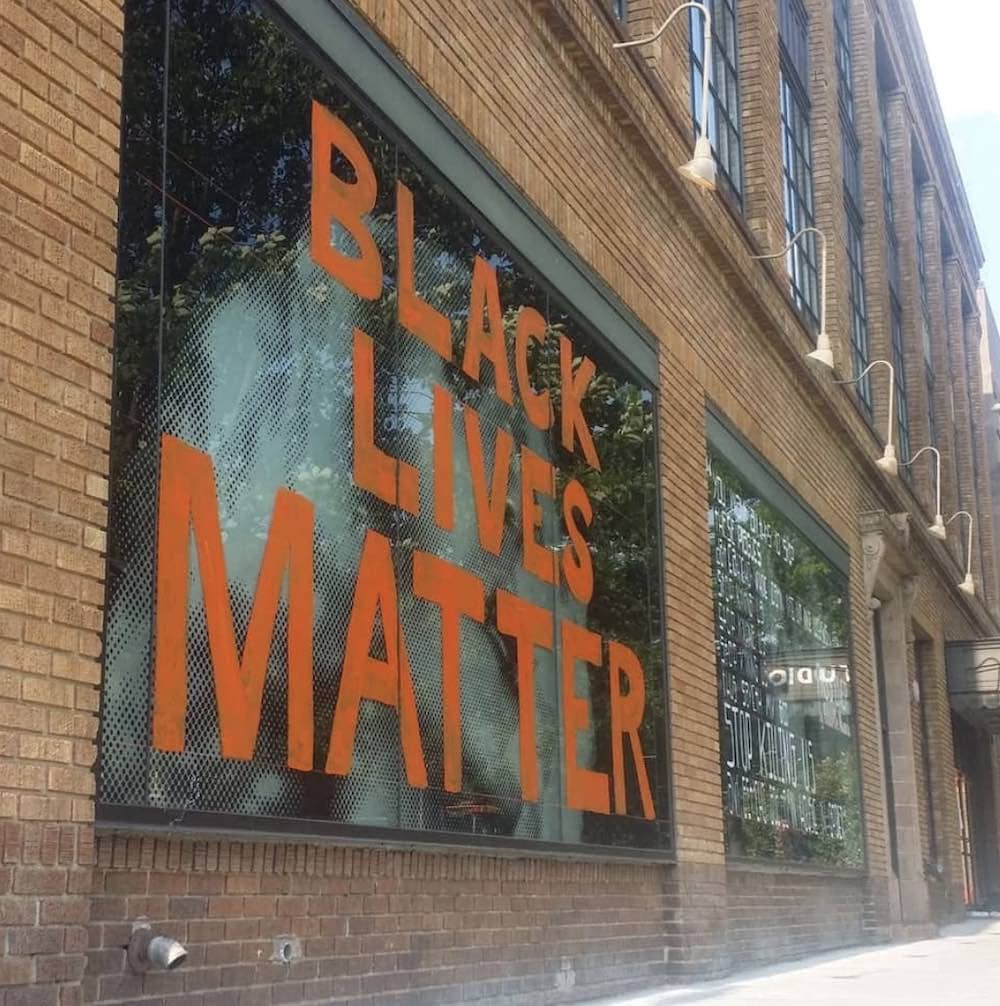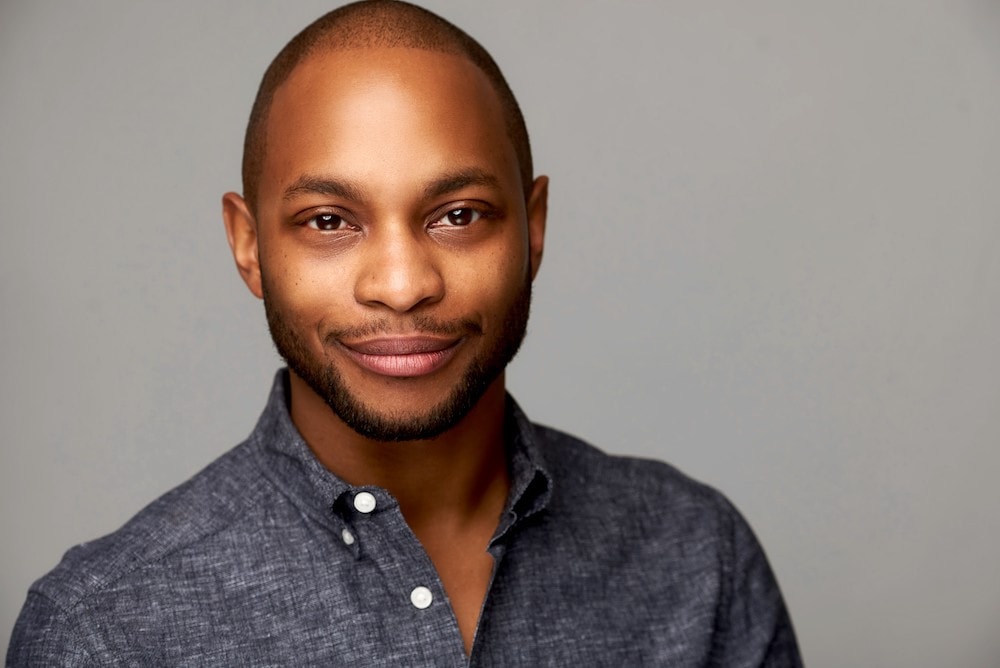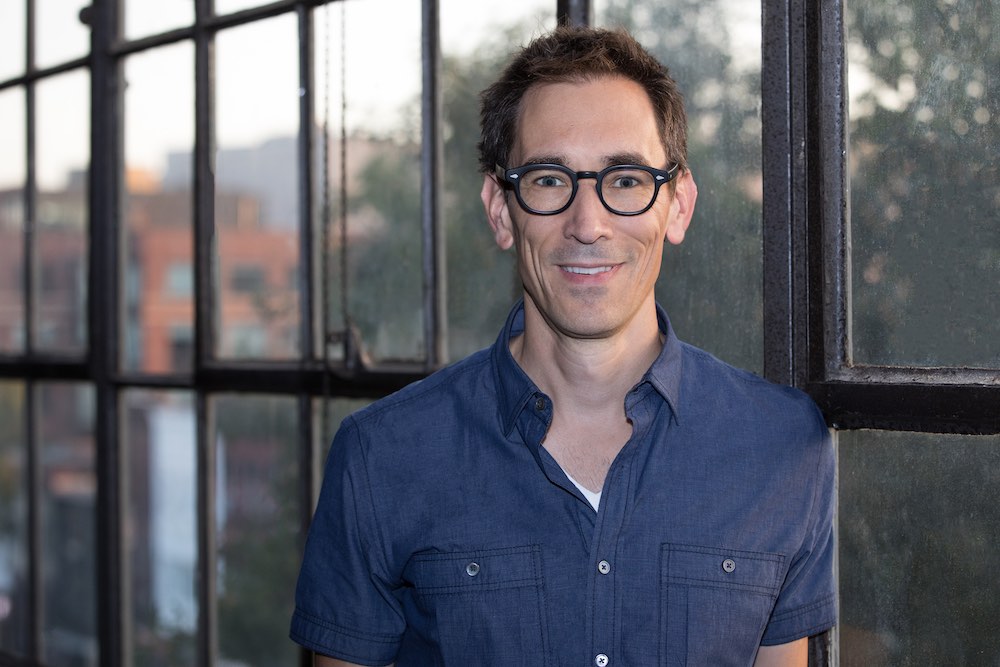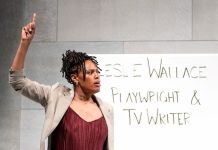The ground feels as if American theater might actually be shifting in the direction of change for Blacks, Indigenous people, and People of Color. Here in the DMV, Studio Theatre is grappling with what real change might actually look like—along with many other theaters locally and nationally.
When Reginald Douglas, Studio Theatre’s associate artistic director, stepped into the role in January this year, George Floyd and BLM protests had not yet come to the forefront of our national conversation on racial justice. The We See You, White American Theater movement also had not shaken up the theater world with its BIPOC Demands for multi-diversity.

But Studio Theatre was already ahead of the curve with a commitment to social change under the new artistic leadership of Reginald Douglas, a Black man.
Studio’s testament to progress went further with Psalmayene 24’s monthly Psalm’s Salons, its March on Washington’s artist voices, and The Breath Project. The building itself has become a vivid canvas of BLM support as envisioned by muralists Leila Spolter and Melissa Carter.
Reginald Douglas, in collaboration with David Muse, artistic director, brings a broader cultural perspective to a historically white-led theater. Focused and intentional, together they are deepening Studio’s pledge to inclusivity and diverse creative excellence—change that the global majority is expecting and no longer willing to be denied.
In separate interviews, Reginald and David talk about the path forward. It was an opportunity to get a rare glimpse from inside a leading local theater in the process of taking action to redefine itself.
Reginald Douglas
“In a world that so often talks about my death,
I come to the theater to share stories about my life.”
Ramona: As new associate artistic director for Studio Theatre, how are you influencing change in outreach and programming as this historically white-led theater shifts in the wake of Black Lives Matter protest? What is your role here in influencing change at Studio?
Reginald: You know, I think about Studio’s work the past two months as not a shift but a deepening. I was attracted to Studio Theatre for many years. When I was a student at Georgetown, I was a fan in the audience. And then in my professional career, I’ve always followed David and the company’s work. So I jumped at the chance to join the staff because the work Studio’s produced has always been conscious, urgent responses, creative responses to the world we live in. And so responding to issues like race and racial injustice is not new for the organization or out of the blue, but the work we’ve done this past few months has definitely been deepened and moved definitely to the forefront of our thinking these days. And I’m proud to have been a part of that. I bring all of myself to my work. And so it’s no secret that I’m a Black man in America and the 2020. And so as I’m personally responding to the reality of the world we’re living in, I’m able to bring that awareness and that perspective into every conversation. And I’m grateful that it’s met with open ears and eyes.

The We See You, White American Theater BIPOC Demands clearly prescribes changes needed for a more equitable American theater. But where is the locus of power for BIPOC arts leaders to effect change? From your perspective, where’s BIPOC leverage to ensure accountability?
Studio is currently working through that document of demands. And so we are definitely aware and taking those demands seriously and doing the work very thoughtfully and urgently at once. I learned throughout my career—typically as someone who’s worked in arts administrative positions and arts leadership positions at predominantly white institutions—that institutions are made up of people. And so I do believe that the more BIPOC people are employed by organizations, organizations do naturally shift. That is my hope and my belief. I also learned that organizations can change. In terms of power, my power doesn’t come from my title; my power comes from within, and I teach that to every student. And I would tell that to any box office attendant, to any usher, all the way up to the executive and artistic directors, that all of us have power. And I think one of the things that the document is calling for is for everyone to be an empowered member of a team. So in terms of the locus of power, I think it’s this power in numbers, for sure. And so it’s changing the demographics of our organizations at every level, from the top to the bottom. That includes changing boards and changing board leadership so that they actively reflect the organization that we want to be.
When you were at Pittsburgh, you headed up equity and inclusion initiatives. Do you have any specific EDI initiatives you plan to launch at Studio?
Sure. Currently the organization is working through—and is undergoing training and thinking around—what does it need to become anti-racist. To me, so much of EDI feels like bandaids and asterisks versus systemic upheaval and systemic change, and Studio is and wrestling with the question of what does it really mean to change and to really reevaluate structures and systems of power. And so in terms of initiatives, it’s being an active participant in that work and leader of that work. Also, in this current moment, we’ve been purposely amplifying the voices of Black artists and Black creatives through our work with Juneteenth, March on Washington, and our Doris Duke Charitable Foundation residency for Psalmayene 24. So it’s not a specific initiative, but I will continue to find ways to empower and employ Black artists in micro and macro ways. And the thing I’m most proud of is that I am committed to this work not being a moment. There’s no timeline on it. There’s no timeline on the commitment to producing work that uplifts and amplifies voices that have been historically marginalized. That’s my life’s work. It’s not my Studio Theatre job.
On a recent Mosaic Theater Company panel on the future of DC theater in the DMV with Laley Lippard, you said creating new voices in theater was a goal of yours. Who are those new voices and what do you hope to hear them communicating to arts leaders and audiences?
I’m always interested in new work and supporting new playwrights. I think artists will lead us in this moment, the way they always have done, to provide new perspectives on the world we live in and new understanding of the human condition. Some of my favorite writers and thinkers right now: Dave Harris, who’s been commissioned by Studio; Angelica Chéri, one of my core collaborators, I just did her show in Baltimore; Josh Wilder; Dominique Morisseau, MacArthur genius winner who’s been produced at Studio and I directed her plays elsewhere. Those are writers that are thinking about the world we live in, in ways that are provocative and personal. And they’re really grounding political themes in our humanity. And to me, the personal is political and the political is personal. And so that’s the art I’m always striving to amplify and to create.
On that same panel, you talked about Black trauma and the power of empathy. Do you think there’s a danger of the theater world tiring of being re-traumatized by the very experiences that it’s trying to overcome?
I have so little interest in producing the newspaper onstage. Our job as artists, Lorraine Hansberry says, is to imagine the world as it could be. And so I’m always interested in taking the power of storytelling, the power of live engagement which is theater, to reflect the world back to us in new and unexpected ways that offer us a different perspective on the news, a different perspective on the history book. And so I totally agree that the idea that trauma is all there is, is wrong, because I’m alive. In a world that so often talks about my death, I come to the theater to share stories about my life. I’m alive, and Black joy is alive and well in the midst of this pain. I’m so interested in stories that reflect the fullness of our existence, which is there’s love in the midst of hate, there’s joy in the midst of pain, and there’s resilience and strength in the midst of fear. Those are the stories I’m interested in telling and the conversations that I want my work as a director and a producer to catalyze and create and foster.
And I’m a Black woman. So I definitely hear you, Reg.
I would joke in rehearsal, you got to have Frankie Beverly and Maze. I’m so tired of seeing those plays and hearing that story that we just cry all day because the strong Black mothers I know don’t have time to cry.
We sure don’t.
So I want to be a part of telling stories that are full of truth, and truth is not trauma alone. Truth is pushing through, resilience in the face of trauma. And understanding that really lets us understand what empathy could mean. I’m in the business of empathy. My job as an artist is to create empathy, deepen understanding of our neighbors. And that’s the power of an organization like Studio Theatre, and that’s the power I think we’re leaning into in this moment. We have a responsibility to our community. Even though our stage is dark, our job is to foster conversations and connections and bring people together. And so I want to hear from Black artists directly: what is their experience of this historic moment? And use their art to share with our diverse audience of all ages and backgrounds the truth of their story. And then let that deepen their understanding of this Black Lives Matter movement. If all you’re seeing is the news, you’re hearing one half the story. I want to hear from the people who are marching in the streets. I want to hear from the women at home, thinking about freedom in this moment. Let’s hear directly from the Black creatives and let their voices guide us towards an understanding of this moment in history—as it is, more so as it could be. That listening is so important right now.
As the new associate artistic director, are you anticipating any internal challenges or external challenges under your leadership?
Oh gosh. You know, I think the biggest internal challenge we’re facing is an industry that is both having a strong reckoning with race in this moment, but also a reckoning with our financial model and our medium being quite broken during this moment of COVID and the shutdown. And so we’re having to rethink a lot of things at once. And that work is often scary for many people. And I understand those fears. I also feel a responsibility to push people past fear. To me, that’s what leadership is. And so when I talk about race with the staff at Studio, it does get heated and delicate at times, and the work can feel daunting, but I’m always interested in reminding people that this work is joyful and transformative and that there’s no testimony without the test. And so we’re being pushed right now to really rethink our systems and our structures, and to reflect on past mistakes and missed opportunities. But we’re going through this pain—whether it’s the reckoning with race, through the We See You, White American Theater demands, or this moment of COVID shutdown—in order to become stronger on the other side. And we have to keep our eye on that prize: that we’re going to create a theater community and company that actively embraces the world around us and those whose stories have been neglected, and those who have been done harm to, in a whole new way, a way that values people, a way that celebrates difference, a way that is equitable. That’s the prize. And that’s an internal and external struggle—to keep myself and our team motivated even when it gets messy.
I’m excited about The Breath Project that’s coming out in the fall. Do you have an update on how that’s going?
I’m one of the guest curators for the festival. So people from around the world were able to submit. And so I’m excited to check out the work. I believe the festival goes live in October. The reason I was so eager to participate and for Studio to participate is it was such an egalitarian process. It really let everyone share their creativity and respond to this moment with their own inspiration. And that to me is what real community engagement looks like—to engage a community, to be actively thinking about their neighbor and using art as the catalyst and the medium to those conversations. So The Breath Project is another way that Studio can live out that value and really open up the call to action to DMV, artists of all ages and backgrounds and all skill levels. I’m really excited and hopeful to see what the final festival looks like.
And so am I. Any closing thoughts you would like to share for our audience?
Studio’s response to George Floyd’s death was personal for me. My spirit was just on fire—as a Black man period, let alone as a Black artistic leader. I knew we had to do something. And so we created a video back in May of me personally responding and saying, We are here. This is who we are. And then we opened up our lobby to protesters in the Black Lives Matter movement. Over the summer, we painted the building with creative artistic inspiration for people marching by. I was walking by the theater as I was out protesting. And it was awesome to see my company’s lived values on display. So when the We See You, White American Theater demands came in in June, it was just another reminder that this work is not done. And Studio’s reaction to that work was, Let’s get to work. And so for the past few months, and with no end in sight, we are working line by line through that document, honoring the labor, the care, and the courage that the writers took to create and share those demands. And over the next few months to years, you will see Studio responding. Some of the work in those documents is work we’ve already been doing for years, that predates me; some of that’s work that I’m excited to help engineer and pioneer for the company. But it’s work that we will be doing in perpetuity. And I’m very proud that our board has already stepped up to support that work fully in a real galvanizing charge. And that is so exciting to me, that the board leadership, our executive leadership, and our senior staff is committed to not just talk, but action. I personally am done talking; it’s time to get to work. And so for Studio, that’s been our charge. Let’s get to work and let’s do the work. And so while we’re thinking thoughtfully, it’s great. Let’s go ahead and commission these artists, let’s support Psalm 24’s vision, let’s empower Black creatives to be their brilliant selves, no questions asked. Let’s do the work while we continue to prepare and grow. I’m proud of that. I’m proud that we’re not sitting back twiddling our thumbs, but we’re doing the work and quite thoughtfully so, you. It’s taking a long time because we’re giving it its due diligence. The only option is systemic change and that’s the work that we’re up to—how do we change our systems and grow into the company we want to be and that our community deserves?
David Muse
“I want people to feel excited about the ways our art form will change as BIPOC artists are afforded more opportunity and more agency.”
Ramona: Under your leadership as artistic director and now in partnership with Reginald Douglas as new associate artistic director, Studio Theatre appears to be solidly moving to live up to the promises of its Solidarity Statement. Since January, Studio’s productions Pipeline and Pass Over were Black-themed. What specifically prompted a historically white-led theater to begin to make a radical shift toward change?
David: From my vantage point, changes at Studio have been more incremental than radical. We’ve made gradual progress toward diversifying our programming and staff. We aren’t yet where I’d like us to be. It has always been a value on some level, but lately our failures to deliver meaningfully enough have become more obvious. That increasing recognition has something to do with what is going on in the country today, something to do with conversations that are happening in broader society, and something to do with calls from within our field for change.

Where would you suggest that other DC theaters might begin in addressing the We See You, White American Theater BIPOC Demands?
I think each theater is going to come up with its own approaches and responses to this challenge—the particular working out of changes like this are necessarily company-specific. What I’m most pleased to see is the conversation happening regularly, pretty much everywhere in the field.
#WeSeeYouWAT is decentralized and without any official leadership. Without a center of gravity for accountability, how can DC theaters best communicate to the public about progress made or not made in addressing these demands?
There are numerous ways to communicate with the public, or with the field, about what theaters are doing: public announcements and press releases, sections of websites devoted to these issues, conversations that are open to the public, social media posts, public commitments that organizations make. And then of course there is implicit communication that comes with season selection, artist hiring, special initiatives, and so forth. And while #WeSeeYouWAT is decentralized, it and other bodies will be working hard to hold institutions to account.
It’s a fact that theater’s white arts leaders and producers fear that dismantling white supremacy in programming might lead to non-monetization for their theaters. What do you say to quell those fears?
Concerns about income and resources are always on the mind of theater leaders, and will come up as theaters contemplate changing programming, institutional policy, and board leadership. It’s hard for me to make blanket statements about these things, but I will note that this pandemic has upended the financial reality of our theaters, and core aspects of our business are changing whether we like it or not. In that sense, it’s an oddly ideal time to contemplate building new and different structures to support the work.
What do you recommend to seize this moment and to keep alive this sense of urgency for change in American theater?
I like to encourage myself, and others if they are so inclined, to think about these changes from an aesthetic point of view in addition to social and moral perspectives. I want people to feel excited about the ways our art form will change as BIPOC artists are afforded more opportunity and more agency. The aesthetic imperative for change is something that I’d like to hear more people talking about.




